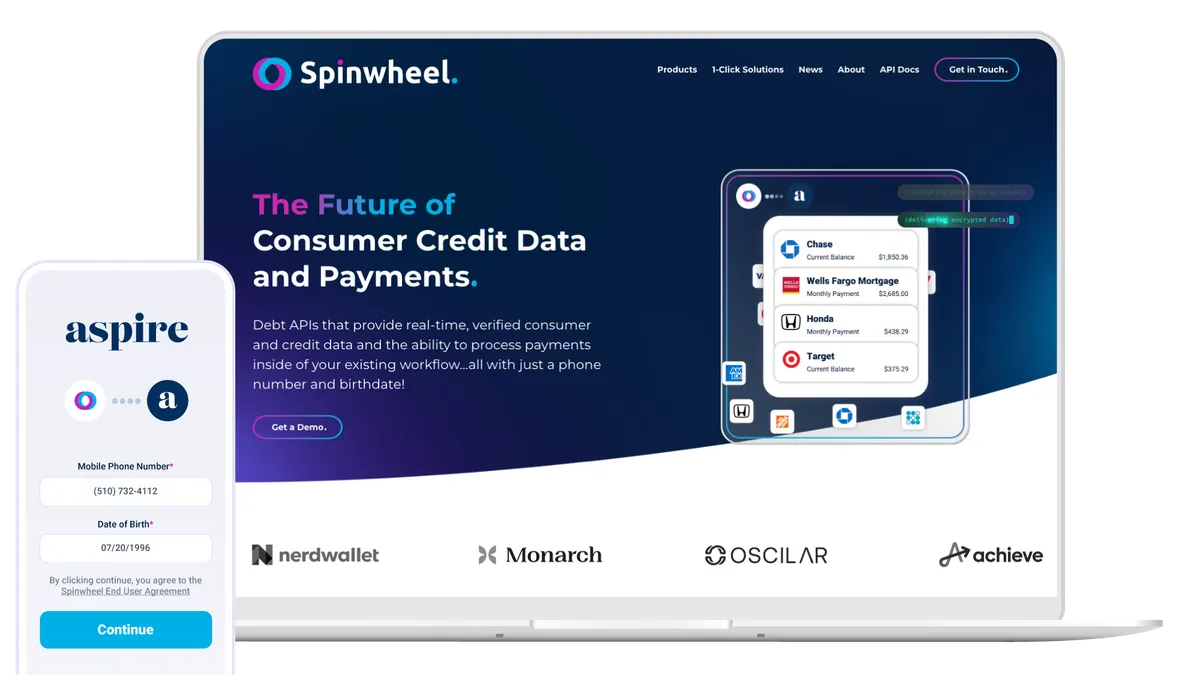Consumer debt management fintech Spinwheel has raised $30 million in Series A funding to unlock and accelerate the innovation of its agentic AI platform while doubling down on its market reach through strategic hiring, the firm’s CEO and co-founder, Tomás Campos, said Monday.
The fintech is currently prioritizing growth over short-term gains as it plans to reinvest capital into developing its product stack and building its product and marketing teams.
Spinwheel’s core solution, Campos said, provides access to unique data and capabilities that are difficult to obtain in the current market, such as finding and connecting all of an end user’s liability accounts and making payments on their behalf by using only the person’s phone number and date of birth.
The fintech has been seeking to enhance its products and services based on market and client feedback. Spinwheel counts lenders, marketplaces, personal financial management platforms, and other financial companies as its clients, providing them with consumer credit data to facilitate payment processing.
With the new capital, it can now deliver many of those capabilities in four months instead of the previous 12-18 months timeline, he said. With the ability to hire additional engineering and product team members, for example, Campos said he’ll be able to fast-track the development of enhanced mortgage and property data solutions for lenders.
The fundraising was primarily a founder-led sales business, in which Campos considered himself a "bottleneck" for sales and marketing functions.

Spinwheel touts itself as the platform that can find and connect all of an end user’s liability accounts and make payments on their behalf by using only the person’s phone number and date of birth.
Campos notes that Spinwheel is creating a market rather than being part of an established one. Its technology in the consumer debt management space would lead it down a path of profitability, as it can sell products with healthy margins where customers pay more than the production costs.
Consumer debt has reached $19.5 trillion — up from $13.3 trillion around a decade ago. An average American holds between 10 and 14 credit accounts, trying to manage the rising costs and inflation.
Being a consumer debt management platform, Spinwheel has seen the implications of rising interest rates, according to Campos.
“With rising interest rates, we also had rising inflation, and so it was a double whammy for the consumer, where everything you're buying was costing more, but then to borrow money costs more as well,” Campos said.
Spinwheel aims to help lenders and consumers navigate challenging times by improving efficiency in lending operations, reducing operational costs and offsetting the rising cost of capital.
It also aims to address the consumer pain points by helping them manage and stay on top of debt, providing tools through personal financial management apps, like Monarch Money, offering debt prioritization guidance (which debts to pay first) and budgeting tools to identify areas to reduce spending while consolidating account management in one platform, Campos highlighted.
He said the company aims to create a value proposition where “all boats rise,” as business clients see tangible value and improved operations, while consumers benefit from better products, increased transparency and enhanced debt management tools.
Spinwheel delayed fundraising for four years to establish strong traction and product-market fit, Campos noted. F-Prime led the recent Series A round with participation from QED Investors, Foundation Capital and Fika Ventures. He noted F-Prime's market research, which validated Spinwheel's vision and execution strategy.
AI vs. human talent
Spinwheel’s artificial intelligence agent automates complex financial data workflows that previously required extensive human intervention. The agent orchestrates multiple backend data calls and tasks to retrieve financial data, enhance the data, support payment processing and execute necessary actions, Campos noted.
Using vehicle loan payoff quotes as an example, Campos noted how Spinwheel’s AI solution now connects all necessary data points through application programming interface-friendly methods, eliminates human intervention in the workflow and delivers the required results significantly faster.
Since its founding in 2019, Spinwheel has connected over $1.5 trillion in consumer liabilities across 165 million accounts. It has processed over 50 million AI-powered payment transactions, seeing a 760% rise in revenue over the past 18 months.
“We can do these things today at scale and a price point and a performance that typically wasn't able to be done before,” Campos said.
However, Campos was quick to point out that despite Spinwheel’s advanced AI capabilities, humans play a vital role in building the underlying technology and identifying the problems that need to be resolved, which ultimately leads to the development of viable products.
He views AI as an efficiency multiplier rather than a replacement for human talent, as engineers, product specialists and AI experts remain fundamental, while sales and marketing units still require human-driven strategy and problem-solving.
“If this was ten years ago, we probably would have to hire double or triple the number of people that we're doing now to be equivalent. But now we don't have to, because everything is more efficient with AI,” Campos said.





















